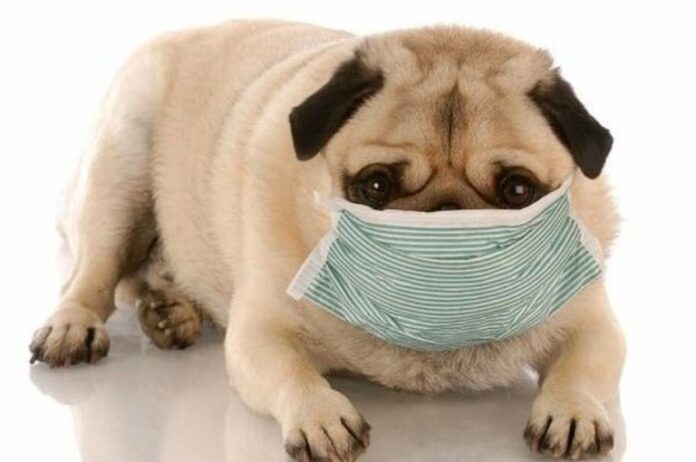Have you ever noticed your dog or any of your furry friends, sneezing or having a runny nose? It could be kennel cough! You might’ve heard of this condition called “parainfluenza.”
It’s a highly contagious respiratory infection that spreads quickly among dogs in places where there’s a large concentration of animals, like boarding facilities or daycares. Of course, you might be wondering about the severity of the infection, is kennel cough deadly?
The answer can be complicated! There are some cases where kennel cough can cause serious problems, but in most cases, treatment can be found.
Read on as I discuss the symptoms, diagnosis, risk factors, preventative measures, and treatments. I will help you better understand kennel cough, and how to protect your dog from contracting the virus.
What Is Kennel Cough?
I’m sure you’ve heard of kennel cough before. It’s a widespread outbreak in the dog world that’s been frequently encountered. It’s one disease you should pay attention to if you own a puppy because kennel cough can potentially be deadly for your dog if left untreated.
But what is kennel cough, exactly? It’s a form of bronchitis, an infectious respiratory disease affecting both dogs and cats. A combination of viruses and bacteria causes it, and its ability to spread quickly from one animal to the other makes vaccinating your puppy essential.
There are some symptoms that I will discuss later in the section, which can tell you if your dog is in agony from kennel cough or not. If you suspect your pet has kennel cough, take them to the vet immediately.
Is Kennel Cough Contagious?
It sure is! It’s not only contagious, but it can also spread through close contact with infected dogs. It’s crucial to be aware of the symptoms in your pet and other surrounding animals to keep your pet safe from those that might be sick.
Kennel cough can most commonly spread through contact with infected saliva or mucus. This means that sharing a bowl or toy with an infected dog, being coughed on, or inhaling secretions will infect your dog.
Therefore, cases of kennel cough tend to be more common in environments where multiple dogs are kept in close quarters like shelters and other dog facilities. That’s why it’s necessary to take your dog to a facility where the staff is knowledgeable about the disease.
Staff members who know of the case will surely take preventative measures to keep your furry friend safe and protect them when you’re not around.
Causes of Kennel Cough
Although I think of kennel cough as one illness, it’s caused by a combination of two or more viruses and bacteria. A dog can catch the virus through direct contact with an infected dog, but it also spreads through the air and contact with contaminated surfaces.
The most common causes are:
- Canine Parainfluenza virus
- Bordetella bronchiseptica bacteria
- Mycoplasma
The main thing you should do to prevent such an illness is to ensure that your dog takes their vaccinations on time. Make sure that your dog is up-to-date with the following vaccines: canine parainfluenza and canine adenovirus type 2, which protects against kennel cough.
Symptoms of Kennel Cough
If your dog is coughing and you believe that it may have contracted the virus, you’ll want to identify the symptoms.
Kennel cough has two different types of symptoms: respiratory and digestive. Common respiratory symptoms include:
- A dry honking sound when your pup breathes in
- Short bursts of a dry, non-productive cough
- Reduced activity levels
- Gagging without bringing out anything
- Shallow or rapid breathing due to chest congestion
Digestive symptoms include:
- Loss of appetite
- Upset stomach with excessive amounts of gas
- Diarrhea and vomiting (may incur blood)
While kennel cough itself isn’t usually considered deadly, if left untreated, it can lead to more severe conditions like pneumonia which can be fatal if not treated correctly.
You should consult your vet if you think your pet may be suffering from kennel cough. Early treatment will help speed up recovery and stop the spread of the virus.
Kennel Cough Risk Factors
Even though there are steps you can take to reduce your pup’s risk of developing kennel cough, it still can happen. I will share with you things that can increase the chance of your pet developing kennel cough:
- Environment: Dogs living in an overcrowded, poorly ventilated area are at a higher risk of contracting the virus. Watch out for this if you board your dog during vacations, or if they spend a lot of time in daycare.
- Age: Puppies and older dogs appear to be more exposed to contracting kennel cough as their immune systems can be weaker than adult dogs.
- Stress: Your pup’s immune system can be weakened if they are feeling anxious or stressed, making it hard for them to fight off a potential infection of kennel cough.
- Other illnesses: If your pet is already ill and suffers from a respiratory infection, it will be more vulnerable to getting kennel cough. That’s why taking extra precautions for their proper care is vital.
Although it’s impossible to fully eliminate the risk of kennel cough, being aware of these risk factors can help you reduce your buddy’s chances of contracting it.
Always make sure that your dogs are living in a comfortable area that is well-ventilated, has minimal stress, and has no contact with sick animals.
How to Treat and Prevent Kennel Cough

In terms of treating and preventing kennel cough, prevention is always the easier solution and less expensive than treatment. It’s important to vaccinate household pets regularly if your goal is to prevent kennel cough.
You should also take care of your pet’s health by making sure they receive plenty of rest and exercise and a healthy diet. This is a necessity for puppies with weakened immune systems.
If your dog is diagnosed with kennel cough, there are specific steps you can take to keep them as comfortable as possible while fighting off the infection:
- Make sure your pet gets all the rest they need as kennel cough can be exhausting, so plenty of resting time and recovery each day is good.
- Supply your pet with lots of love and affection, which will help them feel supported and loved during recovery.
- Provide your pooch with clean drinking water at all times! This will help flush out any bacteria hiding in their system, which could cause further problems if not taken care of properly.
- Try to keep them sleeping in a moist atmosphere at night, you can use a humidifier. This will keep their airways moistened, easing symptoms associated with kennel cough such as shortness of breath.
- Contact your veterinarian and ask them if any antibiotics will help prevent further issues from arising and clear up any existing infections.
Knowing When to Seek Veterinary Care for Kennel Cough
When deciding whether to take your pet to the vet for kennel cough, there are definitive signs you need to look out for. These tips will help guide you in knowing when it’s necessary to take your furry friend to the vet for kennel cough.
Every animal’s case is different from another, so don’t hesitate to get in touch with your vet with any concerns or questions. It’s critical to get a diagnosis from a vet if your pet is displaying any of the following:
Persistent Coughing
If your pet continues to cough for a period that exceeds one week or becomes more severe after initial signs, that’s when you should seek medical attention.
This is especially of high priority if you notice exhaustive breathing or other symptoms like sneezing and discharge from the eyes and nose.
Breathing Difficulties
If your pet is facing difficulty breathing after being exposed to a dog who has kennel cough or might’ve had the virus, seek immediate veterinary attention.
Vomiting or Lack of Energy
If your dog is vomiting, losing appetite, or having a lack of energy to do anything, this could indicate that your dog is facing something more serious than kennel cough.
I’d advise you not to leave it until it’s too late and seek urgent medical advice.
Conclusion
The bottom line is that kennel cough can be deadly sometimes, and pet owners must be aware of the signs, symptoms, and risks.
It’s imperative to take preventive measures, such as vaccinating your pet, monitoring their health on a daily basis, and keeping them safe from other animals.
Most cases of kennel cough can be treated easily with the right veterinary care. Still, taking your pet to the vet as soon as possible is vital if you suspect any illness.
Fundamentally, the best way to protect your pet from potential health problems is to keep them vaccinated, happy, and safe.



